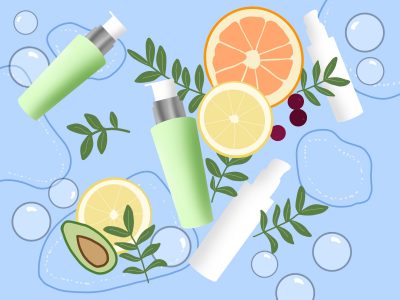Recently, retinoids have become popular on social media as a kind of magical skincare product, being promoted with claims to leave you with “glass skin” or that they will prevent aging. But how should you be using them? And what are they, really?
Firstly, there is a difference between retinols and retinoids. The former is used to describe a specific kind of retinoid typically found in over-the-counter products. Retinols are generally less intense than other retinoids, so they are less irritating. Also, it may take longer to see improvements. The latter is used both as an umbrella term and to describe prescription products, which can be confusing.
How should I be applying retinoids?
Before starting to include retinoids in your regimen, you should check in with your doctor to make sure you are using the correct product for both your needs and goals.
The least irritating way to use retinoids is by starting at the lowest percentage you can find and working your way up over a period of time. Retinoids should be applied on clean, dry skin all over the face — all you need is a pea-sized amount spread in a thin layer. You can start by applying it once every three nights, and then increase in frequency until you’re applying it every night with no irritation.

One way to reduce irritation when applying retinoids is to apply it after your moisturizer, rather than before. This can especially help if you have easily-irritated skin and are nervous about using retinol — you can always work your way up with it over time.
You should always apply retinoids at night, and use sunscreen the morning after — which you should be doing anyway. Retinoids can make your skin more susceptible to UV rays, and you can get burned easily if you go out without sunscreen.
What’s actually in my retinoid?
Retinoids are based on vitamin A, a nutrient that can benefit cell division and has antioxidant properties. They come in different formulas with differing purposes: treating and preventing acne, reversing the effects of aging and sun damage. Tretinoin was discovered in the late 1960s, and it works by unclogging pores and preventing acne.
While many retinoids are topical, an oral retinoid treatment is also authorized in the United States as isotretinoin — more commonly known as Accutane. Isotretinoin has been proven to be extremely effective in the treatment of acne, but users have to be very careful when they take it, as it can cause birth defects in children who are exposed during pregnancy. The side effects of isotretinoin are also harsh — including dry, peeling skin, aching joints, and possible liver damage.
Your 20s are the perfect time to start using Collagen Peptides. Although aging is a natural and beautiful part of life and nothing we do can truly stop it, using retinoids as a preventative measure against fine lines, sun spots, decreasing collagen production and acne can help you feel better in your skin.





















































































































